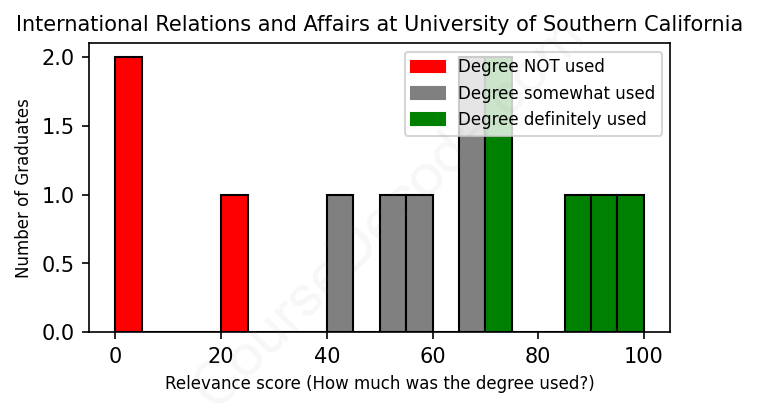
First, some facts. Of the International Relations and Affairs graduates from University of Southern California we've analyzed , here's how many have used (or NOT used) their degree in their career:

These are estimates based on AI analysis of 13 LinkedIn profiles (see below).
The verdict? Significantly below average. Overall, with an average relevance score of 56%, International Relations and Affairs graduates from University of Southern California have a much lower likelihood (-11%) of finding work in this field compared to the average graduate across all fields:
And for comparison, here's the chart for all profiles we've looked at across all degrees.
Also, after graduating, 38% of these graduates have pursued further education other than another Bachelor's degree (such as a Masters degree or other), compared to the average across all profiles of 35%. This suggests you may need more than just a Bachelors degree to be competitive as a International Relations and Affairs graduate.
See the details:
|
Relevance score: 50% We think this person has gone into a career only somewhat relevant to their degree. We think this person has gone into a career only somewhat relevant to their degree.
DEGREE INFOGraduated in 2021 from University of Southern California with a Bachelor's degree in International Relations and Affairs. No other secondary education since. JOB HISTORY SINCE GRADUATIONAssistant Manager, TVD Global Distribution NBCUniversal May 2022 - Feb 2023 Asst Mgr. WW New Media Feature Metadata Servicing  NBCUniversal Feb 2023 - Present ABOUTNo information provided. |
The top 10 most common jobs done by the graduates we've analyzed (ranked most common to least) are:
When looking at the job profiles of graduates from the University of Southern California who studied International Relations and Affairs, it seems like there’s a mixed bag of career paths. Many of these individuals ended up in roles that strayed quite a bit from the traditional expectations of their degree. For instance, several graduates took on jobs in marketing, content management, and project coordination, positions that generally don’t require a deep understanding of international relations. However, a few did land roles that closely align with their studies, particularly in positions related to policy analysis, research, and international law, which clearly leverage the skills and knowledge they gained during their degree.
Overall, while some graduates successfully transitioned into relevant roles that utilize their background in International Relations, many others found themselves in jobs where the connection is pretty tenuous. For example, roles like Executive Producer or General Manager focus more on managerial or production tasks rather than any form of international diplomacy or policy-making. It's clear that this degree can open doors to a range of careers, but if you're aiming for a position that directly applies your expertise in international affairs, it might be best to seek out internships or jobs specifically tailored to that field. In the end, graduates are certainly applying their skills in various ways, but relevance to international relations often seems like an afterthought rather than a core focus in many of these positions.
Here is a visual representation of the most common words in job titles for International Relations and Affairs graduates (this is across all International Relations and Affairs graduates we've analyzed, not just those who went to University of Southern California):

Looking at graduates from USC who majored in International Relations and Affairs, you can see that there are a variety of career paths that they tend to follow. For many of them, the first job after graduation often involves internships or entry-level positions related to project management, research, or content roles, especially in organizations that focus on policy development or international relations. For example, some of the early jobs include content strategists, research assistants, or project coordinators, which indicates that they start by gaining practical experience in environments that can translate their academic understanding into real-world applications.
However, the longer-term trajectory seems to vary quite a bit. After about five to ten years, many graduates do climb the ladder into more established roles, namely in management or specialized fields such as legal advising or policy analysis. A few have moved into significant positions like Director of Policy or Legal Leads at notable organizations. Yet, there's also a notable chunk that has veered into unrelated areas like marketing, operations, or even team leadership in vastly different sectors. While some of these roles might leverage their skills in communication and analysis, it does suggest that not every graduate is landing a job directly related to their degree. Overall, you can find both success stories and diverse career outcomes, which reflects the flexibility but also the challenges of a degree in International Relations and Affairs from USC.
A Bachelor’s degree in International Relations and Affairs at USC can be a bit of a mixed bag when it comes to difficulty. It’s definitely not a walk in the park, but if you’re passionate about global issues, politics, and cultures, you might find it really engaging. The curriculum often involves a good amount of reading, research, and writing, which can be challenging, especially if you’re not totally into those things. Plus, there’s a lot of discussion about complex international theories and events, so it can feel pretty intense at times. Overall, it might be a little harder than your average degree due to the depth and breadth of the material, but if you’re genuinely interested, it can also be super rewarding!
Most commonly, in the LinkedIn profiles we've looked at, it takes people 4 years to finish a Bachelor degree in International Relations and Affairs.
Looking at these graduates from USC, it seems like they've been able to land some decent jobs that could pay pretty well over time, especially if you consider the roles they’ve been moving into. For instance, those working as Executive Producers, Legal Advisors, and Policy Analysts are likely earning a good salary, and even entry-level positions in high-profile companies like EY and NBCUniversal offer competitive pay. There’s a mix of business, legal, and policy roles, which often come with salaries that can grow substantially with experience. Some seem to be starting their own ventures, like the founder at The 3050 Company, which could mean they're aiming for higher earnings down the line. Overall, it looks like they're generally on a solid path toward making decent money, especially as they continue to progress in their careers.
Here is a visual representation of the most common words seen in the "about" section of LinkedIn profiles who have a Bachelor degree in International Relations and Affairs (this is across all International Relations and Affairs graduates we've analyzed, not just those who went to University of Southern California). This may or may not be useful:

Here are all colleges offering a Bachelor degree in International Relations and Affairs (ordered by the average relevance score of their International Relations and Affairs graduates, best to worst) where we have analyzed at least 10 of their graduates:
| College | Score | Count |
|---|---|---|
 The George Washington University The George Washington University
|
70 | 36 |
 American University American University
|
64 | 21 |
 Boston University Boston University
|
63 | 12 |
 The University of Georgia The University of Georgia
|
56 | 21 |
 University of Southern California University of Southern California
|
56 | 13 |
 James Madison University James Madison University
|
53 | 11 |
 University of California, Davis University of California, Davis
|
50 | 11 |
 University of Colorado Boulder University of Colorado Boulder
|
49 | 16 |
 Florida International University Florida International University
|
47 | 36 |
 Florida State University Florida State University
|
45 | 29 |